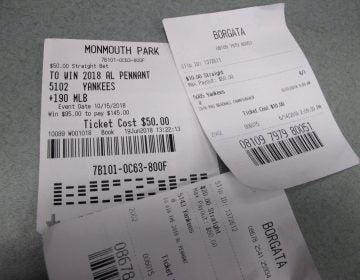After years in limbo, New Jersey prepares to take its first sports bet
The atmosphere has public officials and gambling houses alike feeling like they just hit the jackpot.
Listen 6:01
Bettors wager in the sports book at the South Point hotel and casino in Las Vegas. Now that the U.S. Supreme Court has cleared the way for states to legalize sports betting, Pennsylvania is reviewing applications from facilities that want to offer wagering on sports events. (John Locher/AP Photo)
New Jersey is about to cash in on sports betting.
After a protracted legal battle and millions spent in court costs, the state will finally be able to accept legal wagers on sporting events, thanks to a May opinion from the U.S. Supreme Court that overturned a federal ban on sports betting.
The atmosphere has public officials and gambling houses alike feeling like they just hit the jackpot.
“I’m happy with this,” said Dennis Drazin, who runs the Monmouth Park racetrack in Oceanport. “We’re going to make money. We’re going to save racing. The state’s going to make money. This is a win-win for everybody.”
The New Jersey Thoroughbred Horsemen’s Association, which Drazin also oversees, has been a plaintiff on some of the lawsuits against the major sports leagues and the NCAA, that wanted to keep the federal ban on sports betting in place.
Early in the fight over sports betting, Drazin realized that the track could not subsist on race earnings alone. He would need another source of revenue. “Sports betting means survival for Monmouth Park,” he said.
Now Monmouth Park, in partnership with the sports-wagering company William Hill, is preparing to open the doors of its newly developed sports book and grandstand.
The racetrack is not the only venue set to take advantage of sports betting. Several casinos in Atlantic City have already announced that they too will offer wagering on athletics.
Ocean Resort Casino, which is opening in late June in the former Revel building, will partner with William Hill on a sports book. The Borgata, owned by MGM Resorts International, plans to offer sports betting, too.
Rummy Pandit, executive director of the Lloyd D. Levenson Institute of Gaming Hospitality & Tourism at Stockton University, said sports betting could help Atlantic City reshape its image to appeal to a younger crowd.
“There is a whole new market that will be coming to New Jersey now, and they’ll be coming not just for sports betting,” Pandit said. “They’ll be coming for the experience. We are gaming. We are entertainment. We are hospitality. We are food and beverage. All of the above. And we have a beach.”
One of the biggest winners of the court decision is the state of New Jersey itself.
Under a bill passed by the Legislature Thursday, the state would tax in-person wagering at 8.5 percent. (Online bets will be taxed at 13 percent.)

In recent legislative testimony, state Treasurer Elizabeth Muoio estimated that New Jersey would earn about $13 million from sports betting in its first year.
Other observers say that is a conservative calculation. The American Gaming Association estimated that people in the U.S. illegally wager $150 billion on sports annually.
That is not to say there has been no opposition to opening the floodgates to sports betting in the Garden State.
The four major professional sports leagues — baseball, basketball, football, and hockey — as well as the NCAA still greet legalized sports betting with skepticism.
At first the leagues asked New Jersey lawmakers to levy an “integrity fee” on each bet, money they said would be sent to the leagues to help them police illegal wagering or game-fixing. The Legislature declined.
The leagues also asked state legislators to require casinos and race tracks to share data and information on betting patterns.
“If casinos have information that a fix is in, if casinos see the brother of a player come into a casino 10 minutes before a game, place a large bet on his brother to perform poorly in the game, and make comments about how the fix is in, the casinos have no obligation under this law to contact us directly and let us know,” said Bryan Seeley, a representative of Major League Baseball, in legislative testimony this week.
Still, none of the wrinkles in ironing out what sports betting in New Jersey will look like seem to have overcome the feeling of euphoria that many officials say they feel at finally having the legal blessing to offer wagers on athletics, a push that began a decade ago.
In 2008, former Union City Mayor Rudy Garcia went to place a bet with his bookie and instead walked into an FBI sting. He was arrested and charged. (The charges were later dropped.)
His friend and law partner, Ray Lesniak, heard what happened to Garcia and found the whole ordeal unfair.
“I got very concerned that he was arrested for doing something here in New Jersey that he could’ve gotten on a plane and [done] in Las Vegas,” Lesniak said, noting that, as a child, he illegally “carried bets for my dad to the local grocery store to place.”
A state senator at the time of Garcia’s arrest, Lesniak decided to do something about what he saw as an injustice.
First he successfully pushed for an amendment to the New Jersey Constitution. Then Lesniak and the administration of then-Gov. Chris Christie went to court with the four major sports leagues, who were trying to keep the federal ban on sports betting in place.
The ensuing legal battles lasted years but finally ended in May, when the U.S. Supreme Court overturned the Professional and Amateur Sports Protection Act of 1992, calling it unconstitutional. (Although states had a chance to legalize sports betting before the passage of PAPSA, only four did, and New Jersey was not one of them.)
Lesniak said the odds were against him all along, but he came out on top. “All these great legal minds [said] ‘Lesniak has no idea what he’s talking about. There’s no way this is going to happen.’ That’s why I feel just a little bit of self-satisfaction.”
Lesniak hopes Gov. Phil Murphy signs the sports betting legislation quickly.
And when Murphy does, Lesniak said, he wants to place the first legal sports bet in the state’s history: on the New York Giants to win next year’s Super Bowl.
WHYY is your source for fact-based, in-depth journalism and information. As a nonprofit organization, we rely on financial support from readers like you. Please give today.




